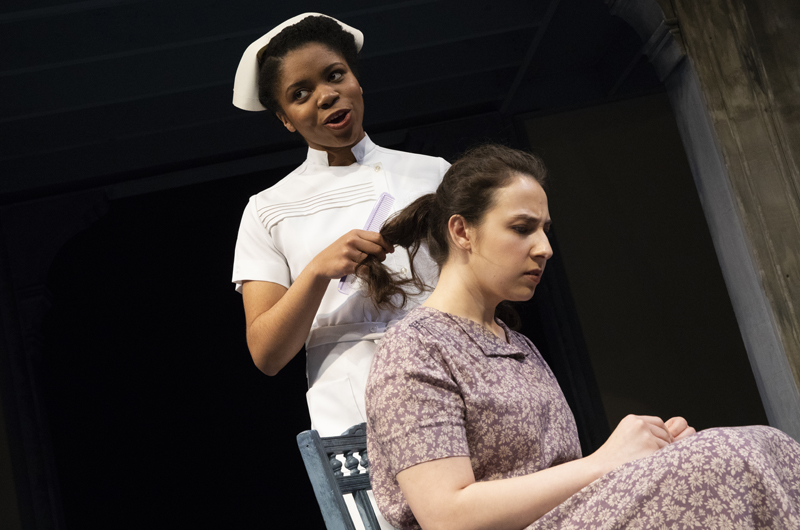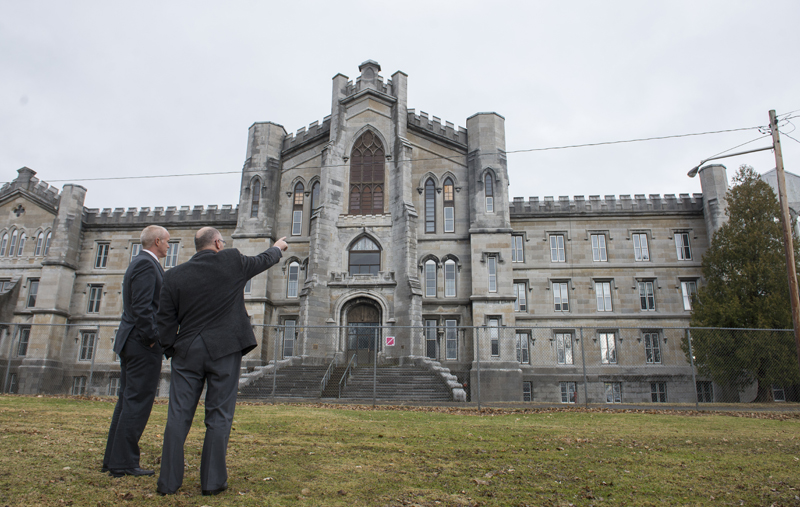Binghamton State Hospital’s history inspires theatre production
Assistant Professor Elizabeth Mozer writes and directs 'Castle on the Hill'

There’s a moment in “Castle on the Hill” when a character hears a voice from beyond the grave; a voice that’s comforting, familiar and unforgettable.
It’s an echo of how Elizabeth Mozer, assistant professor of theatre, came to write the play: She was touring the now-shuttered Binghamton State Hospital when her guide recounted the remarkable story of Agnes, a now-deceased resident of the asylum that, for decades, housed people who had been declared insane. Mozer understood, immediately, what she would do.
“I knew I had to make a theater piece on this. It’s so amazing. It’s a true story, and it’s the spine of my play,” she said.
“Castle on the Hill” is about a young woman whose mother died when she was little. She is haunted by memories that are like puzzle pieces that don’t fit together. She turns to therapy and is led to the Binghamton State Hospital, known locally as “the Castle,” where she discovers something unexpected.
All of the characters in this original mainstage production, which opens April 27 in Watters Theater, are based on real people. Mozer’s research involved reading written accounts of the Binghamton State Hospital and meeting people in the community who had lived or worked there. Many connections came by word of mouth.
“It’s been a thrill for me to talk to people about their experiences there,” she said. “Many of the stories I encountered had an element of heroics, in that people had to deal with such difficult situations, and many of them found ways to stay truthful to themselves as much as they could, to hold on to their sense of identity and humanity.”
“Castle on the Hill” is an expanded version of Mozer’s 2017 one-woman show, “The Asylum Project,” in which she played five different characters. This time, 12 students play all the characters and, in an unusual twist, the student actors played a significant role in determining how the final version of the play came together.
It’s what Mozer calls a “devised theater” piece: The actors take the material and, through improvisation and collaboration, create the final version.
“They don’t just go off and learn lines, I’m asking them to co-create with me and be responsible, as co-creators, for the whole, to support their fellow actors in finding the best work,” she said.
“We all came in knowing the play wasn’t finished yet, and we all had a lot of work and creative thinking to do,” said sophomore Mayah Wells. She plays Nurse J, who takes care of Agnes.
“Nurse J is based on a real person; I met the son of Nurse J. And the more I explore this character, the more I realize how much we have in common,” Wells said. “Nurse J is very motherly, she loves her patients and treats every single patient like they’re her children. People tell me I’m a motherly figure, I’m very compassionate. I love how I’m able to blend that into this work and my character.”
Margaret Leisenheimer, a junior theatre major with a minor in education, plays Agnes.
“I think Agnes is one of the most courageous and joyous people I’d ever read in a play,” she said. “At first I was nervous about doing justice to her and her story. Now I’m so proud that I get to have this connection with her.”
What the students are doing is very demanding, Mozer said.
For instance, she said, “There’s not a lot of backstory for the characters, so the actors have to develop that. They have to answer, ‘Why am I here, how long have I been here, do I ever get out?’”
Then the actors have to ensure their individual characters work as an ensemble.
“Part of my job is to create an environment where the actors are truly connected – heart, mind, soul and body – and that they can respond truthfully in a moment with a sense of character,” Mozer said.
She also asks them to look at scenes and listen to dialogue from the director’s point of view and make suggestions.
“It’s been great – a tall task – but it’s been so much fun to be in the room creating together,” Mozer said of the actors.
They work with a live script; scenes might be changed, moved or struck, and it’s one person’s job to keep the script updated in a Google drive.
There are several themes running through the play. One is that love transcends time. Another is about being able to see ourselves in others.
Wells hopes audience members will look for relationships and not focus on the patients’ illnesses: “Everyone has a special story. Some people have real reasons to be there, and some were just forced there.”
Mozer said to look at what’s driving each character and imagine yourself in their place. How did they get there and what’s it like to be there?
“I’m not looking to judge the choices of yesterday but to allow voices to resonate so that we can understand, in present time, how these voices continue to shape our relationship to mental illness,” she said.

